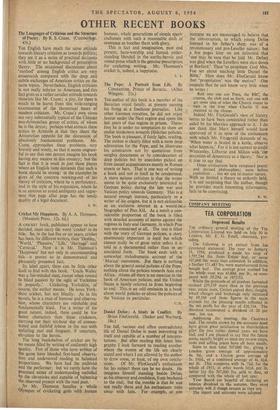THE author of this book is a member of the
Bavarian royal family, at present earning his living as a freelance journalist. Like other German royalties, he did not enjoy favour under the Nazi regime and spent the last years of that regime in prison. There- fore he is under no temptation to show an undue tenderness towards Hitlerian policies. The book is pleasant, if fairly light, reading. The author is clearly filled with a most deep admiration for the Pope, and he illustrates his admiration not by quotations from weighty documents or by consideration of deep policies but by anecdotes picked up from casual acquaintances mostly in Roman streets or bars. That is one way of writing a book and not in itself to be condemned. A more serious criticism is that the writer seems to be quite exclusively interested in German policy during the late war and Vatican policy towards Germany. This is a natural enough interest, particularly to a writer of his origins, but it is not defensible as an exclusive interest in a would-be biographer of Pius XII. As a result a con- siderable proportion of the book is tilled with detailed accounts of moves against the regimes in Italy and Germany, in which Pius was not concerned at all. The rest is filled with the story of German policies, a story enormously important in itself but which cannot really be of great value unless it is told in a documented rather than in an anecdotal form. The book ends with a somewhat melodramatic account of the 'Marian' movement. But there is nothing about the general social policies of the Pope, nothing about the policies towards Asia and Africa. Above an there is no mention in the book of American policies, and the United States is barely referred to from beginning to end. This is an odd omission in a hook about world policies or about the policies of the Vatican in particular.
c. H.


































 Previous page
Previous page